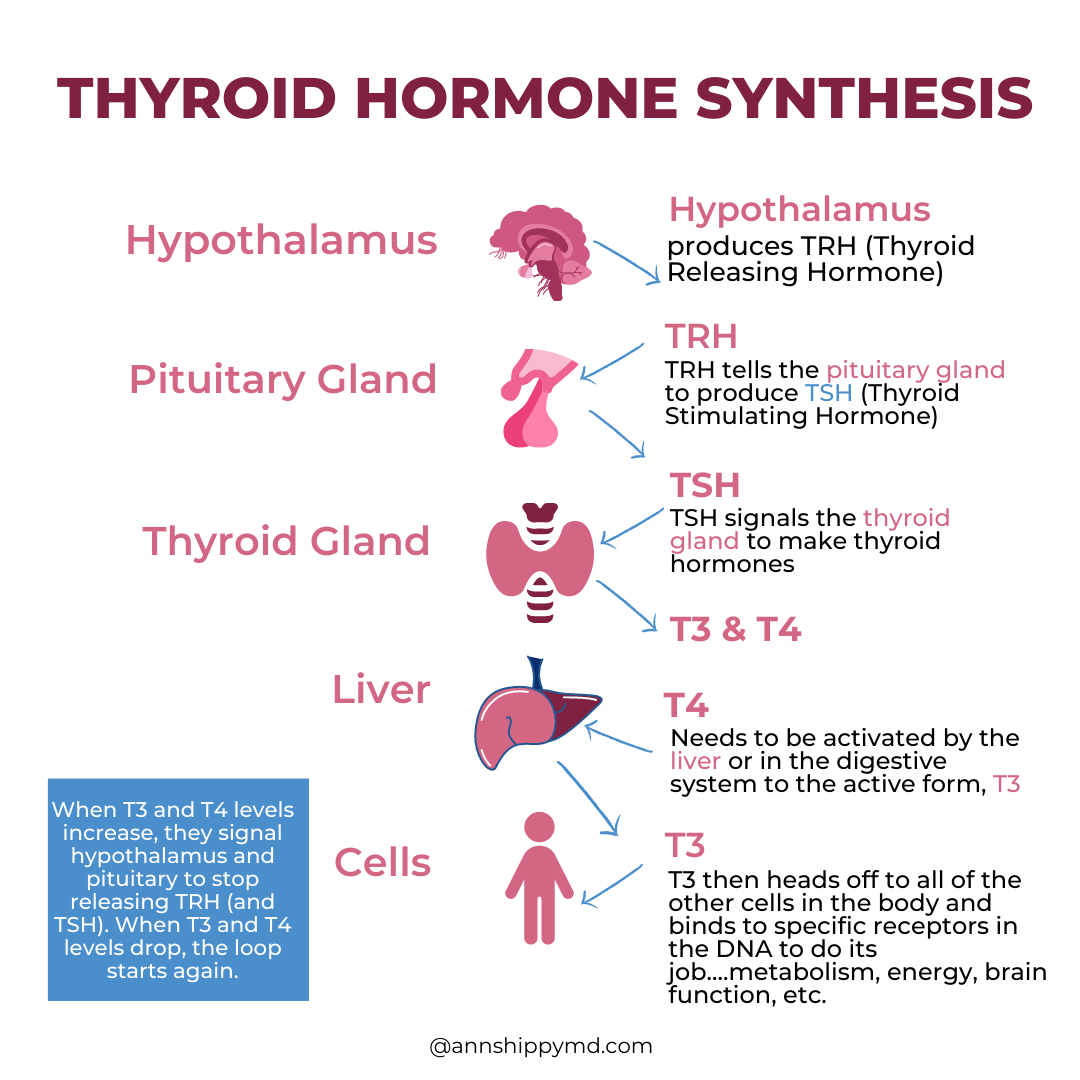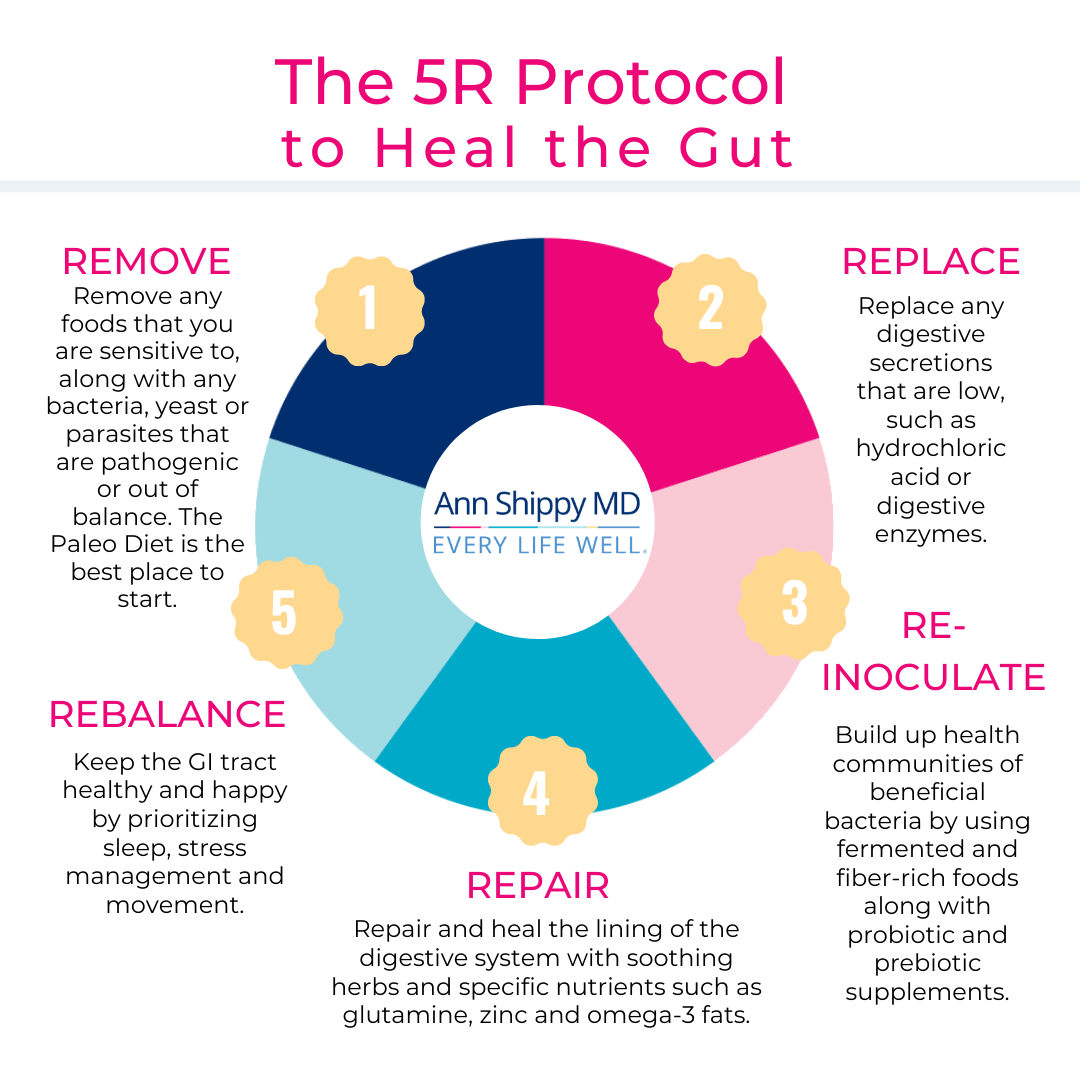A Functional Medicine Approach to Hypothyroidism
Have you been to your doctor with symptoms that seem random and non-specific only to be brushed aside or handed a prescription for an antidepressant?
I’ve heard so many stories from women and men over the years who felt cold, tired and simply could not lose weight even when their diet and lifestyle were dialed in. They all have a similar tale of going to their doctor, or even several doctors, only to be told that their lab tests were “normal” and the symptoms were in their head.
As a Functional Medicine physician, these stories are so disheartening because I’ve seen how taking a deeper look and honoring my patient’s experience makes all the difference in the world. By doing appropriate testing and taking a bit more time and attention, we often find an explanation for the symptoms described.
One explanation that is quite common is hypothyroidism or the autoimmune version called Hashimoto’s thyroiditis. Once we have the diagnosis, our goal is to find effective long-term healing solutions, instead of simply treating the symptoms.
We do this by asking the question, “why,” in order to fully understand the contributing factors and put together a personalized treatment plan that gets to the root of the symptoms.
The result is you feeling like yourself again.
In this article you will learn more about:
- Hypothyroidism and common symptoms
- Why you need to test a full thyroid panel instead of just TSH
- Hashimoto’s thyroiditis, the autoimmune hypothyroid condition
- Action steps to address your personal thyroid root causes
What Is Hypothyroidism?
The thyroid is a butterfly shaped gland that sits in the front of your neck over your Adam’s apple. The thyroid’s main job is to produce thyroid hormone.
Thyroid hormone binds to every cell in the body in order to maintain the basal metabolic rate. In other words, it controls your metabolism. And your metabolism is so much more than your weight, which we will discuss in more detail.
Hypothyroidism refers to low thyroid function, as measured by low thyroid hormones, and high TSH (thyroid stimulating hormone). Since thyroid hormones increase the feeling of energy in the body, when these hormones are low, everything in the body seems to slow down, causing a wide range of symptoms.
Some of the most common symptoms of hypothyroidism are:
- Anxiety or depression
- Constipation
- Cold hands and feet
- Brain fog
- Hair loss
- Goiter – enlarged thyroid gland
- Fatigue
- High cholesterol
- Dry skin
- Infertility
- Low immunity
- Weight gain or weight loss resistance
Some of these symptoms might mimic another condition or are mild or inconsistent enough that they are brushed aside, either by you or your provider.
It’s easy to think that elevated cholesterol and weight are solely caused by your diet or that hair loss and brain fog are related to a stressful time or loss of sleep.
The commonality I see between these symptoms is an issue with not enough energy in the body and that is a major clue that something may be off with thyroid health, which leads me to order a full thyroid panel as part of the evaluation.
Thyroid Testing
A full thyroid panel allows me to gain a complete view and often will be able to detect imbalances that are more nuanced than simply an elevated thyroid stimulating hormone (TSH) which is often the only lab test viewed in these cases.
To understand the full thyroid panel, it helps to see how the different hormones work together in the body.
In the brain, the hypothalamus produces TRH, thyroid releasing hormone, which tells the pituitary gland to produce TSH, thyroid stimulating hormone. You’ve probably had your TSH level tested, at one point or another, as this is the most common hormone test to assess thyroid function.
Unfortunately, many people are told TSH is “normal” even if you also experience symptoms or there are other imbalances that you weren’t tested for. The range for TSH is quite wide and I find that a more narrow, functional range is a better assessment.
TSH is the hormone that signals the thyroid gland to make thyroid hormone, the majority of which is in the inactive form T4.
T4 needs to be activated by the liver or in the digestive system to the active form, T3.
When looking at labs, I want to know the total T4 and total T3, along with the free versions called free T4 and free T3.
This lets me see how much hormone there is and how much is available for immediate use.
I also want to look at reverse T3, which is the body’s way to deactivate thyroid hormone to slow down body functions during times of stress. In some cases, thyroid imbalances go hand-in-hand with adrenal imbalances presenting a chicken or an egg question of what came first.
Then, T3 can head off to all of the other cells in the body, bind to specific receptors in the DNA to do its job.
It’s important to mention that for all of this to function properly, good nutrition is needed, and especially the micronutrients iodine, selenium, iron, vitamin A and vitamin D. Sometimes hypothyroidism is the result of nutrient deficiencies, and other times the nutrient deficiencies aren’t the whole picture.
The other labs that are important to see when assessing hypothyroidism are the antibodies: thyroid peroxidase (TPO) antibodies and thyroglobulin antibodies. These labs indicate if there is an autoimmune process impacting thyroid health.
As you can see, the full panel paints a much better picture of thyroid function where TSH only tells a sliver of the tale.
Hashimoto’s Thyroiditis
90% of hypothyroid cases are autoimmune, and we see elevated antibodies in lab tests.
This means that simply replacing thyroid hormone, which is the standard medical care, or addressing nutrient deficiencies, is an important piece in holistic thyroid care, won’t get to the root cause of the tissue destruction and we need to think about immune health.
All autoimmune diseases share three root causes: a leaky gut, a genetic predisposition and a trigger.
In the gut, tight junctions hold the cells together for optimal absorption of nutrients, but when the gut becomes “leaky” – because of toxins, microbiome imbalances, stress and other factors – larger food, improperly digested, and other proteins enter the body causing an immune response.
Through a process known as molecular mimicry, the immune system mistakes the body’s own tissue for these foreign proteins and mounts an attack.
While there isn’t a specific gene that causes Hashimoto’s, people with autoimmune disease may have similar changes, or SNPs – single nucleotide polymorphisms, that influence the root causes. They may have poor methylation, which makes it hard to repair and detoxify, for example.
Epigenetics plays a huge role as well. Diet and lifestyle affect how our genes are expressed. So where one person may be better at tolerating poor quality food and environmental toxins, someone with autoimmunity might need to be more careful in order to improve gene expression.
The third underlying factor in autoimmunity is a trigger and the trigger might explain why someone develops autoimmune disease while someone else doesn’t. A huge trigger for Hashimoto’s is gluten. Others include pesticide exposure, heavy metals and stress.
When all three factors are present, it’s the perfect storm for developing an autoimmune disease.
Thyroid Action Steps
When we see the root causes and contributing factors, we can easily see how to make changes to support both thyroid health and long-term healing. If hypothyroidism, and especially Hashimoto’s is a concern for you or a loved one, follow my actionable steps to take on your healing journey.
1. Heal the gut. Imbalances in microbiome health, bacterial overgrowth, pathogenic infections, poor diet, antibiotic use and other factors make way for permeability, or leaky gut. For more information on all of the pieces to consider for gut healing, see my article on the 5R protocol.
2. Support epigenetics. While you may have polymorphisms in important genes, you can override them using good nutrition, supplements and self-care strategies in order to optimize your genetic expression. A lot of the support here will center around supporting detoxification pathways, balancing methylation and supporting energy systems. B vitamins, sulforaphane, and mitochondrial support are worth considering and exploring as supplement solutions.
3. Remove triggers. While I recommend starting with a gluten-free diet, it may be important to test for celiac disease first. Celiac is an autoimmune condition in the small intestine that is triggered by gluten, the protein in wheat. I’ve seen many patients who have both autoimmune diseases and improvements in labs, including antibodies, from adopting a gluten-free or grain-free diet when they have celiac disease or gluten sensitivity. To test for gluten allergies, celiac or gluten sensitivities, I order either the Enterolab or the Vibrant Wheat Zoomer.
Besides gluten as a trigger, toxins are a huge category of potential triggers to consider. Whether it is glyphosate, mercury, PFAS and others. This is a topic I’m very passionate about and you’ll find many articles in my archives about toxins to be aware of and how to make swaps and lifestyle changes in order to reduce exposure.
4. Work with a Functional Medicine doctor. Since no two people with hypothyroidism or Hashimoto’s are alike, what will work for your healing will be unique. Testing will reveal different needs for healing the gut, nutrient needs, toxin exposures and genetic SNPs. Many patients will benefit from medication, including thyroid replacement, along with following a personalized hypothyroid diet, specific supplements and other individual lifestyle changes. Working with a provider, such as myself, will often help you on your journey and get you living your best life.
If you’ve ever had your concerns dismissed in the medical system, I’m here to tell you that there is hope and another way of looking at your symptoms or diagnosis that will leave you feeling empowered to take action.
Here is to all of you who didn’t stop when your concerns were invalidated, but instead, trusted your intuition and continued to dig deeper and explore.
My hope is that this article helped to validate your experience and fill in some pieces of your own health puzzle.
References















